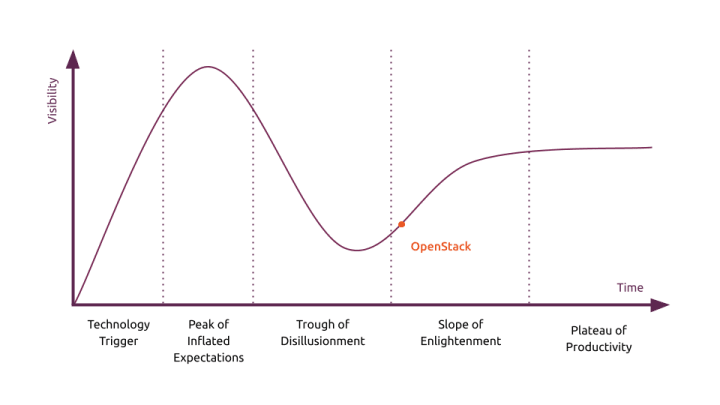Composable infrastructure, sustainable computing and more: OIS 2022 highlights
Tytus Kurek
on 14 June 2022
OIS 2022 is over, but the OpenInfra community stays tuned for the next OpenInfra Summit, taking place in Vancouver in 2023! This year’s summit in Berlin offered a lot of insightful keynotes and technical sessions. Speakers discussed the most recent trends in the industry, including composable infrastructure and sustainable computing, and set the pace for the next releases of the OpenInfra-hosted project, including OpenStack. It was a great opportunity to reconnect in person after the pandemic.
If you missed the event, read on to get a summary of the most notable highlights from OIS 2022, Berlin.
OpenStack enters the Slope of Enlightenment
During my keynote on Day 1, I discussed the fact that OpenStack has just entered the Slope of Enlightenment phase of its Hype Cycle. Most organisations have realised that OpenStack and Kubernetes are in fact complementary technologies rather than competing ones. Canonical happens to be well-positioned, as Ubuntu is a platform that integrates OpenStack, Kubernetes and applications very well.
To prove this, we presented four recent case studies from customers who have adopted an Ubuntu-based infrastructure, including OpenStack and Kubernetes. Their use cases include:
- a general-purpose private cloud,
- telco network function virtualisation infrastructure (NFVI),
- local public cloud infrastructure,
- a foundation for high performance computing (HPC).
We see that OpenStack continues to be used more often these days.

OpenStack public clouds
Whoever passed through the marketplace at the venue couldn’t miss the booths of public cloud providers. It was super exciting to see all of those companies who have successfully built their own local public cloud infrastructure on OpenStack. Many of them are now extending their offering to other parts of the world, effectively competing with hyperscalers – or preparing to compete.
According to Mark Collier’s keynote, there are now 180+ public cloud providers all over the world who use OpenStack as a platform for cloud infrastructure implementation.
Together, these companies account for 27% of the cloud market. During one of the lightning talks, Canonical talked about seven reasons to become a business like that, especially from the mobile operator perspective.
Learn more about public cloud implementation on Ubuntu >
Composable infrastructure
Composable infrastructure was definitely another main trend that was discussed during the summit. It was covered by Toby Owen from Fungible and covered in more detail throughout the rest of the week. Composable infrastructure assumes that more and more functions are moved away from the traditional x86 processor architecture into SmartNICs and data processing units (DPUs), leaving hypervisors as a pure set of compute resources for cloud workloads. During the OpenStack Yoga development cycle, our team at Canonical delivered open virtual network (OVN) offloading capabilities in OpenStack Neutron, moving network services down to SmartNICs and DPUs.
Read NVIDIA’s reference implementation >

Sustainable computing
Stuart Grace from BBC delivered an insightful keynote on sustainable computing. His session, titled “Building Environmental Dashboards for OpenStack at BBC R&D”, showed how combining real-time data from electricity producers with metrics from OpenStack hypervisors helps BBC monitor and eventually reduce the environmental impact of various workloads. This story fits very well with a global trend around minimising carbon emissions generated by data centres and the overall trend towards sustainable computing.
Watch an OpenInfra Live episode about sustainable computing >
OpenStack Ops Meetup
On a day after the summit, Deutsche Telekom hosted an OpenStack Ops Meetup to discuss various challenges centred around running OpenStack in production. The topics discussed included OpenStack for VMs and containers, Ceph for storage and common issues with OpenStack operations. They also covered upgrades and a variety of tools available out there that help to tame the complexity of OpenStack, etc.
All summit sessions
All summit sessions, including those delivered by Canonical, have been recorded and will be available on demand. Visit the OpenInfra website and the OpenInfra YouTube channel for the latest updates.

OpenInfra Summit Vancouver 2023
The next OpenInfra Summit will take place in Vancouver, BC, from the 13th to 15 of June 2023. As of today, there is no more information available yet, but details are coming on the OpenInfra website soon. Book those dates in your calendar and let’s see each other in Vancouver again!
Contact Canonical if you have any questions regarding OpenStack, open infrastructure or any other trends discussed at the summit.
Smart operations, optimal architecture, better pricing.
OpenStack and Ubuntu bring automated deployment and management that help you optimise infrastructure costs — no matter your industry or use case.
Newsletter signup
Related posts
VMware alternatives: discover open source
Are you looking for VMware alternatives? Think open source – the world’s leading software portfolio. Open-source software enables you to build fully...
Join Canonical in London at Dell Technologies Forum
Canonical is excited to be partnering with Dell Technologies at the upcoming Dell Technologies Forum – London, taking place on 26th November. This prestigious...
Join Canonical in Paris at Dell Technologies Forum
Canonical is thrilled to be joining forces with Dell Technologies at the upcoming Dell Technologies Forum – Paris, taking place on 19 November. This premier...
